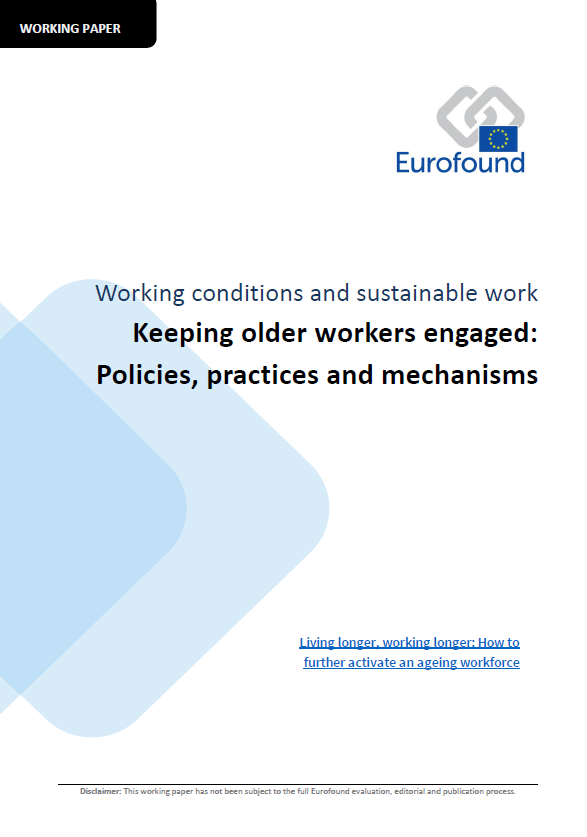EU context
I přes výrazný nárůst míry zaměstnanosti starších pracovníků v posledních deseti letech v mnoha zemích EU společná zpráva Evropské komise o zaměstnanosti za rok 2017 upozorňuje na potenciál dalšího zvýšení této míry. V roce 2016 dosahovala míra zaměstnanosti starších pracovníků ve věku 55–64 let v EU 55,3 %, v porovnání s 66,6 % u pracovníků ve věku 15–64 let jako celku. Nárůst byl největší u starších žen.
Evropský pilíř sociálních práv poskytuje rámec, který pomáhá trhům práce přizpůsobovat se novým výzvám a současně prosazovat zásadu spravedlnosti a mezigenerační solidarity. Poukazuje na právo, aby bylo pracovní prostředí přizpůsobeno profesním potřebám pracovníka tak, aby umožňovalo prodloužení jeho o účasti na trhu práce. Kromě toho v nedávno přijaté autonomní dohodě evropských sociálních partnerů o aktivním stárnutí a mezigeneračním přístupu je obsažen závazek umožnit starším pracovníkům aktivní účast na trhu práce a umožnit jim setrvat na tomto trhu déle.
Činnost nadace Eurofound
Nadace Eurofound se zabývá problémy spojenými se stárnutím pracovní síly dlouhodobě. Výzkumy od devadesátých let dvacátého století se zaměřují na účast na trhu práce, pracovní výkonnost, pracovní podmínky a pracovní preference starších pracovníků v rámci politik zaměřených na měnící se demografický profil Evropy. Činnost nadace se rovněž zaměřuje na veřejnou podporu a iniciativy na úrovni podniků na podporu zaměstnávání starších pracovníků. Výzkumy se zaměřují rovněž na starší pracující ženy a z jejich výsledků vyplývá, že míra zaměstnanosti v této skupině narůstá a její podíl na celkové ekonomické aktivitě roste, zejména ve věkové skupině 55–64 let.
Údaje z průzkumu
Hlavní průzkumy nadace Eurofound poskytují celé spektrum údajů situaci starších pracovníků. Šestý průzkum pracovních podmínek v Evropě se zaměřuje na srovnání starších pracovníků v různých rozměrech kvality pracovních míst. Ačkoli jsou starší pracovníci ohroženi nezaměstnaností méně než mladší pracovníci, z údajů vyplývá, že starší pracovníci mají pocit, že v případě ztráty zaměstnání by už nemuseli najít podobně placenou práci a návrat na trh práce by pro ně mohl být obtížný.
Jedna studie vycházející z pátého průzkumu pracovních podmínek v Evropě nadace Eurofound zkoumá vlastnosti starších pracovníků a práce v různých věkových kategoriích, stejně jako činitele, které činí práci pro stárnoucí pracovní síly udržitelnou: dobré pracovní podmínky, tělesná a duševní pohoda a rovnováha mezi pracovním a soukromým životem.
Průzkum kvality života v Evropě nadace Eurofound nabízí poznatky založené na věku související s různými rozměry kvality života v Evropě. Analýza pracovních preferencí u lidí starších 50 let vychází z poznatků třetího průzkumu kvality života v Evropě a ukazuje, že řada starších pracovníků dává přednost kratší pracovní době, a to i po zohlednění svých finančních potřeb. Usnadnění tohoto lepšího sladění pracovní doby s preferencemi může umožnit lidem, aby pracovali déle, a také je motivovat.
Delší pracovní život
Nedávno se nadace Eurofound společně se třemi dalšími agenturami EU zaměřila na práci přizpůsobenou starším lidem v Evropě, politické výzvy související se stárnutím pracovní síly a inovativní řešení.
Mnoho pracovníků není schopno pracovat až do zákonem stanoveného věku odchodu do důchodu nebo k tomu nemá motivaci. Existuje však také skupina lidí, která je schopná a ochotná pracovat ještě déle. Nadace Eurofound se zabývala tímto stále častějším jevem práce po odchodu do důchodu.
Nedávný výzkum se zaměřoval na prodloužení pracovního života prostřednictvím flexibilních penzijních systémů, přičemž se soustředil zejména na penzijní systémy s částečným starobním důchodem, které by mohly toto prodloužení pracovního života usnadnit. K prodloužení pracovního života mohou rovněž přispět hodnocení kariérního rozvoje v polovině období. Výzkum se rovněž zabývá tím, jak mohou tato hodnocení pomoci vyjasnit pracovníkům jejich možnosti, pokud jde o setrvání v zaměstnání do pozdějšího důchodového věku. Upozorňuje na různé nástroje vytvořené společnostmi, které mají za cíl udržet stárnoucí pracovní sílu.
Další výzkum dokumentuje vnitrostátní a odvětvové iniciativy vlád a sociálních partnerů na udržení starších pracovníků na trhu práce, včetně finančních pobídek a zlepšování podmínek. V jednom z dřívějších projektů byly analyzovány iniciativy řízení věkové struktury zaváděné před recesí a po ní s cílem ukázat osvědčené postupy v Evropě.
Zdroje
























